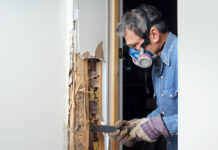By Frank Meek, BCE
With COVID-19 placing many businesses on hold, business owners are getting creative for relief, and rodents are doing the same. Empty streets and reduced trash output have rodents scavenging for food and new shelter, forcing them to travel more than usual in pursuit of these resources. And since rodents typically travel up to a few hundred feet from their residence in search of food, their presence is quickly spreading, especially in urban areas. While urban environments are more susceptible due to the dense amount of people, attractants and infrastructure, house mice and Norway rats are found throughout the U.S. and roof rats are common along the coast. So, wherever your property may be, rodents pose risks to your facility’s structure and the health of its inhabitants.
 While your property’s front doors may be experiencing less traffic, rodents have alternative entry points. Mice can squeeze through a hole a quarter inch wide and rodents through holes as small as one-half inch. This means gaps under closed doors and holes from utility and plumbing lines are wide open for rodents. Openings resulting from poorly fitting HVAC and utility accesses and poorly maintained wall and foundation vents offer additional entrances. For rats, roofs also offer access. Because some species, like roof rats, prefer to be high in the air, these rodents may climb on power lines or tree branches to get on the roof, where they can enter through gaps in the air handling and utilities found there.
While your property’s front doors may be experiencing less traffic, rodents have alternative entry points. Mice can squeeze through a hole a quarter inch wide and rodents through holes as small as one-half inch. This means gaps under closed doors and holes from utility and plumbing lines are wide open for rodents. Openings resulting from poorly fitting HVAC and utility accesses and poorly maintained wall and foundation vents offer additional entrances. For rats, roofs also offer access. Because some species, like roof rats, prefer to be high in the air, these rodents may climb on power lines or tree branches to get on the roof, where they can enter through gaps in the air handling and utilities found there.
Not only can rodents can squeeze into small spaces, they can create entryways with their strong teeth. Norway rats will gnaw away at hard surfaces to enlarge a potential entryway or often burrow their way inside by digging. Once in your facility, rodents can cause serious structural damage. Rats can cause extensive and costly damage from chewing on electrical wires to ripping up insulation and damaging furniture and storage boxes. Their chewing can even ignite an electrical fire.
And these pests are more than just bottom feeders; they threaten public health. Rodents can spread diseases and contaminate what they eat. Diseases they are capable of spreading include salmonellosis and hantavirus, a pulmonary syndrome transferred via inhalation of rat droppings, urine, or saliva. They can also transmit rat bite fever through bacteria in their mouth and LCMV Lymphocytic Choriomeningitis Virus, which is especially dangerous for pregnant women as it can cause birth defects.
Unfortunately, most rodent species are known for their ability to reproduce very quickly. Most rats become sexually mature between two and five months, producing three to six litters per year that consist of six to eight young each. A single female mouse, meanwhile, can produce up to eight litters per year with an average of six pups per litter.
Fortunately, however, there are steps you can take to help reduce your property’s risk of rodents, especially during quarantine.
- Address communal spaces. Since many properties abruptly closed with the introduction of COVID-19, facility managers may have not had the time to consider important cleaning and sanitation steps that help keep pests out, especially in kitchens and breakrooms. Just because your property’s communal areas may be closed, doesn’t mean they’re not occupied. Unkempt places are at high risk for rodent activity, especially if they are currently unmonitored.
- Reduce food sources. When addressing communal spaces, also pay attention to potential food sources, like snacks, liquids and trash.
- Practice good sanitation. Garbage cans should have a secure lid and be emptied on a regular basis. Be sure to have your dumpsters cleaned and rotated to help reduce the potent smells that can attract rodents.
- Maintain landscaping. Mice can hide amongst tall grass and overgrown bushes. Norway rats are accomplished diggers and burrowers, making them attracted to uncut grass and thick shrubs. And roof rats can use tree limbs as a bridge to your facility. Regular landscaping maintenance can help reduce attractive rodent hideouts that lead them closer to your property.

- Keep your property clean and disinfect surfaces. All pests, including rodents, find unkempt spaces all the more attractive. Use a powerful, low-toxicity disinfectant to kill bacteria and pathogens that may be living on surfaces. Failure to properly disinfect your frequently used touch points can lead to the spread of harmful pathogens. Ensure the disinfectant used is included on the EPA’s “List N.” These products are EPA-registered and labeled for use against a wide variety of pathogens. Orkin, for example uses a powerful disinfectant on the list to kill 100% of bacteria and viruses on hard, non-porous surfaces.
- Involve your pest control provider. Pest control providers have been deemed an “essential service,” and for good reason. Consider having your provider conduct an inspection to ensure your property is protected. Continuing pest prevention services can help keep your property operating smoothly during this otherwise turbulent time.
Even though your business is not operating at its usual capacity, it is still susceptible to pest infestations. In fact, with the absence or reduction of humans present it is even more at risk during this time, as pests are more active without the daily routines of occupancy, enabling populations to become severe in a short period of time.
Taking the time to address potential rodent issues now could help avoid a headache later. Keep these tips and tools in mind and be sure to involve a professional if you see signs of activity, knowing your occupants will appreciate this precaution, especially now.
Frank Meek is a Technical Services Manager for Rollins, LLC. As a board-certified entomologist and a 30 plus year industry veteran, he is an acknowledged leader in the field of pest management. Contact Frank Meek at fmeek@rollins.com or visit www.orkincommerical.com.
Want to read more about facility management and safety?
Check out all the latest facility management news related to Safety.




















![[VIDEO] Collect Asset Data at the Speed of Walking a Building](https://facilityexecutive.com/wp-content/uploads/2024/02/maxresdefault-324x160.jpg)